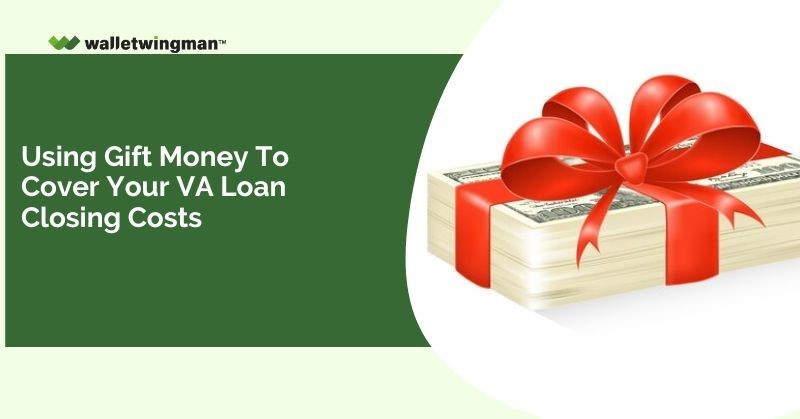The VA home loan program offers several significant benefits, such as buying a house with no down payment.
However, many military members and veterans using this program deals with closing costs. These VA loan closing costs estimate can accumulate thousands of dollars on a typical house purchase.
Fortunately, the Department of Veterans Affairs permits borrowers to use gift money provided from an approved third-party donor to cover closing costs.
To utilize “gift funds,” specific rules and requirements must be adhered to. One of these requirements involves obtaining a letter from the donor confirming that the gift funds are not intended for repayment.
In this article, we will examine VA loan closing costs, the use of gift money, and the necessary letter requirements.
What Are Closing Costs, Exactly?
The term “closing costs” refers to the several fees and expenses a home buyer must pay in order to complete a mortgage transaction and secure a home purchase. These costs are applicable to all mortgage loans, including VA home loans, and may consist of various VA loan closing costs and fees. The following includes VA loan closing costs breakdown of fees and charges:

- Lender Fees: These are charges associated with obtaining a mortgage loan. They can include application fees, loan origination fees, and discount points.
- Title and Escrow Fees: These fees cover the services of a title company. Which ensures the clarity of the property’s title and manages the transfer of funds and documents.
- Home Appraisal Fees: These charges are associated with evaluating the property’s condition and determining its fair market value, which is mandatory for all VA loans.
- Property Taxes and Insurance: During closing, you might need to prepay a portion of property taxes and homeowners’ insurance.
- Recording and Notary Fees: These fees cover the cost of officially recording the property transfer and having a notary witness the signing of documents.
VA loan closing costs for buyer can differ depending on the location of the home and the services you need. They usually range from 2% to 5% of the home purchase price; these expenses can accumulate to a considerable amount.
According to Zillow, the median home value in the United States is currently around $350,000. At that price point, closing costs of 2% to 5% could range from $7,000 up to $17,500.
While VA loans provide the benefit of bypassing a down payment for VA loan, it’s crucial to be aware that considerable upfront expenses can still arise in the form of closing costs.
Gift Money to the Rescue

Now, here’s the positive aspect of this situation. The Department of Veterans Affairs permits the use of gift money to help cover your VA loan closing costs.
Gift funds are precisely as they sound. It’s when somebody gives you money with no strings attached. This money can be put toward your down payment (if you opt to make one) and/or your closing costs.
The VA loan process imposes specific requirements regarding gift funds used for VA loan closing costs. In general, the fund must come from someone who is closely connected to the borrower. Such as a family member or lifelong friend. It cannot come from any “interested party to the transaction,” like a real estate agent or a home builder.
Moreover, the fund must genuinely be a gift, with the donor not expecting any form of repayment. It cannot be structured as an interpersonal loan.
The All-Important Gift Letter
The Department of Veterans Affairs requires the person donating the money to submit a “gift letter.” The gift letter is different from a VA loan application. This letter’s requirements are simple and straightforward, making the process uncomplicated. The gift letter does not need to be extensive; a concise two or three paragraphs should meet the requirements.

A VA loan gift letter should, at a minimum, include the following components:
- The exact amount provided by the donor.
- A statement from the donor confirms and ensures that no repayment of gift funds is expected.
- The donor’s name, address, phone number, and relationship to the borrower.
The mortgage lender will verify the transfer of funds to the borrower’s account or the closing agent before finalizing the closing process and funding the loan. This ensures transparency and accuracy in the financial aspects, and for a precise estimation, one can use a VA loan closing costs calculator.
As a home buyer using a VA loan, you have the option to request the seller for VA loan closing costs assistance. As permitted by the Department of Veterans Affairs. Whether or not the seller agrees is a different story altogether.
Sellers are generally more willing to offer such “concessions” in a slower real estate market when offers are few and far between. In contrast, in a more competitive market with multiple offers, sellers might be less inclined to offer contributions towards closing costs. Therefore, it is recommended that you consult with your real estate agent before making such a request.
One of the Many Benefits This Program Offers
Leveraging gift money for your VA loan closing costs is just one of several benefits this program offers. Additionally, it allows you to finance up to 100% of the home’s purchase price, thereby avoiding the need for a down payment.

When you combine these two benefits—using gift money for closing costs and securing 100% financing—you essentially overcome the most significant obstacle to homeownership.
For some well-qualified homebuyers, the challenge lies in covering the initial expenses, and it’s understandable. When you consider both the down payment and closing costs for a standard home purchase, the total can amount to tens of thousands of dollars.
For homebuyers using VA loans, the prospect of avoiding the down payment and utilizing gift funds to offset closing costs becomes a viable option. Suddenly, the perceived hurdles to homeownership don’t seem as formidable.
Additionally, VA loans often accommodate individuals with lower credit scores, making homeownership more accessible for those considering a VA loan with bad credit. Understanding the VA loan credit score requirements is crucial for prospective homebuyers seeking financial assistance through this program.
With the VA loan program, the barriers to homeownership diminish, making the dream of owning a home more achievable for qualified buyers. It not only offers the flexibility to finance 100% of the home purchase but also allows the use of gift funds to cover closing costs, setting it apart in the comparison of VA loan closing costs vs conventional.
Embracing the benefits of the VA loan program can turn homeownership aspirations into a tangible reality.


